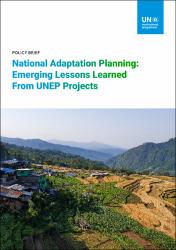Mostrar el registro sencillo del ítem
National adaptation planning : emerging lessons learned from UNEP projects : policy brief
| Licencia | Creative Commons Atribución-NoComercial 4.0. | es |
| Autor | United Nations Environment Programme (UNEP) | |
| Fecha de admisión | 2024-02-03T20:38:10Z | |
| Fecha disponible | 2024-02-03T20:38:10Z | |
| Año | 2023 | |
| Citación | United Nations Environment Programme (UNEP) (2023). National adaptation planning: emerging lessons learned from UNEP projects: policy brief. Nairobi: United Nations Environment Programme (UNEP). Recuperado de: | es |
| ISBN | 978-92-807-4072-1 | |
| URI | https://bvearmb.do/handle/123456789/3984 | |
| Sinopsis | To better inform adaptation planning and implementation, this briefing note summarises lessons, practices and areas of future adaptation support from the National Adaptation Plans (NAP) that UNEP is supporting in 23 countries from Africa (Eswatini, Ghana, Lesotho, Malawi, Mauritania, Nigeria, Rwanda, Sao Tome and Principe, Uganda, and Zimbabwe), Latin America (Costa Rica, Dominican Republic, Honduras, and Panama), and the Middle East and Asia (Iraq, Lao PDR, Maldives, Mongolia, Myanmar1 , Nepal, and Pakistan). Many of these NAPs are at an early stage of implementation, and this analysis, therefore, builds on from 6 countries that have progressed the furthest in their NAPs (Costa Rica, Dominican Republic, Iraq, Nepal, Sao Tome and Principe and Zimbabwe). | es |
| Idioma | English | es |
| Publicado | Nairobi: United Nations Environment Programme (UNEP) | es |
| Derechos | © 2023 United Nations Environment Programme. | es |
| URI de derechos | This publication may be reproduced in whole or in part and in any form for educational or non-profit services without special permission from the copyright holder, provided acknowledgement of the source is made. | es |
| Materia | Gestión ambiental - Planificación | es |
| Materia | Cambio climático | es |
| Título | National adaptation planning : emerging lessons learned from UNEP projects : policy brief | es |
| Tipo de material | Booklet | es |
| Tipo de contenido | Technical report | es |
| Acceso | Open | es |
| Audiencia | Technicians, professionals and scientists | es |
Ficheros en el ítem
Este ítem aparece en la(s) siguiente(s) colección(es)
-
Gestión ambiental [2910]


